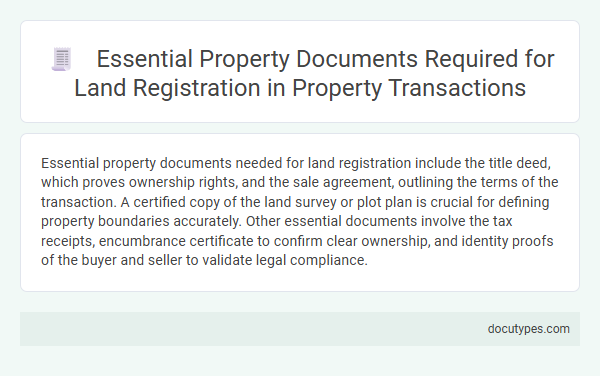Essential property documents needed for land registration include the title deed, which proves ownership rights, and the sale agreement, outlining the terms of the transaction. A certified copy of the land survey or plot plan is crucial for defining property boundaries accurately. Other essential documents involve the tax receipts, encumbrance certificate to confirm clear ownership, and identity proofs of the buyer and seller to validate legal compliance.
Introduction to Land Registration in Property Transactions
Land registration is a crucial process in property transactions that ensures legal recognition of ownership. It provides a public record that protects the rights of property owners and facilitates secure transfers of land.
Essential property documents for land registration include the title deed, which proves ownership, and the property survey report that defines boundaries. A no-objection certificate (NOC) from relevant authorities verifies that the land complies with regulations. Additional documents such as tax receipts and encumbrance certificates confirm the property is free from legal liabilities and disputes.
Importance of Property Documentation
Proper property documentation is crucial for land registration as it establishes legal ownership and prevents future disputes. Essential documents include the title deed, tax receipts, and identity proofs, which verify your claim and ensure transparency. Maintaining accurate records safeguards your investment and facilitates smooth transfer or development of the land.
Sale Deed: The Prime Legal Document
Sale Deed is the fundamental legal document for land registration, proving the transfer of ownership from seller to buyer. It ensures the buyer's legal claim to the property and is essential for a clear title.
- Proof of Ownership - The Sale Deed acts as concrete evidence that the property ownership has legally changed hands.
- Sale Consideration Details - It records the agreed purchase price and payment terms between parties.
- Property Description - Contains precise details about the land, such as location, boundaries, and exact area.
Title Deed and Ownership Proof
Title Deed is a fundamental document establishing legal ownership of land and proving your claim to the property. Ownership Proof includes documents such as sale deeds, tax receipts, and allotment letters that verify rightful possession. These essential property documents ensure smooth and lawful land registration processes.
Encumbrance Certificate for Clear Title
What are the essential property documents needed for land registration? A critical document is the Encumbrance Certificate, which verifies the property is free from legal dues or mortgages. This certificate ensures a clear title, protecting buyers from future ownership disputes.
Latest Property Tax Receipts
Latest property tax receipts are crucial documents for land registration, serving as proof of tax payment and ownership legitimacy. These receipts ensure that the property is free from outstanding tax dues, facilitating a smooth registration process.
- Proof of Tax Payment - Latest property tax receipts confirm that all municipal or local taxes on the land have been paid up to date.
- Ownership Verification - These documents help verify the current owner's responsibility for the property, supporting legal ownership claims during registration.
- Clearance of Encumbrances - Updated tax receipts demonstrate the absence of pending tax liabilities, which is essential for preventing disputes in land registration.
Khata Certificate and Extract
Registering land requires specific property documents to establish legal ownership and avoid disputes. Two essential documents for this process are the Khata Certificate and the Khata Extract.
The Khata Certificate serves as proof of property ownership in municipal records and is crucial for paying property taxes. The Khata Extract provides detailed information about the property's size, location, and ownership details, which supports accurate land registration.
Identity and Address Proof of Parties
Identity and address proof are critical documents required for land registration to verify the authenticity of the parties involved. These documents establish the legal identity and residential details of the buyer and seller.
Accepted identity proofs include government-issued documents such as passports, voter ID cards, or driving licenses. Address proofs often encompass utility bills, ration cards, or bank statements, ensuring that the parties' locations are accurately recorded.
Approved Building Plan and Completion Certificate
| Document | Description | Importance in Land Registration |
|---|---|---|
| Approved Building Plan | The official architectural blueprint sanctioned by the local municipal or development authority, detailing the layout, design, and specifications of the building to be constructed on the land. | Ensures legal compliance with zoning laws and building regulations. Confirms that construction adheres to safety and environmental standards, crucial for obtaining permissions and avoiding future disputes during land registration. |
| Completion Certificate | A document issued by the local governing body or municipal authority certifying that the building has been constructed according to the approved plan and meets all structural and safety guidelines. | Validates that the construction is complete and compliant. This certificate is critical for finalizing land registration and for obtaining utility connections and occupancy rights. |
What Are the Essential Property Documents Needed for Land Registration? Infographic

